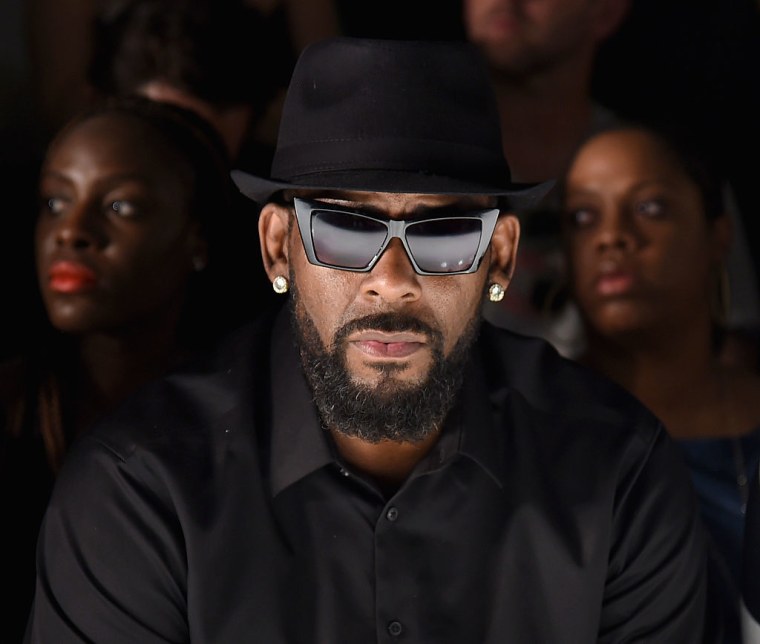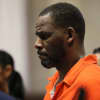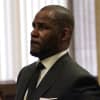 R. Kelly attends New York Fashion Week. July 14, 2015.
Photo by Michael Loccisano for Getty Images
R. Kelly attends New York Fashion Week. July 14, 2015.
Photo by Michael Loccisano for Getty Images
On Monday July 17, BuzzFeed published a new report on R. Kelly from Jim DeRogatis, longtime rock critic, author, and lecturer at Columbia College Chicago. DeRogatis’s piece – in which families of young women alleged that Kelly was abusing them physically and “brainwashing” them in a “cult”-like relationship – is disturbing. But for music lovers of a certain age, it is not shocking, thanks to the two decades of reporting DeRogatis has filed on R. Kelly’s alleged sexual crimes.
DeRogatis was working at the Chicago Sun-Times in 2000 when he received an anonymous fax claiming that R. Kelly, then already an R&B legend with tens of millions of album sales, was under investigation for sex crimes against underaged girls. Over the course of years of reporting, he heard corroborating allegations from dozens of women across Kelly’s hometown of Chicago, and revealed Kelly’s forged marriage certificate to Aaliyah that listed the singer as 18 years old (she was in fact 15). After Kelly was acquitted on child pornography charges in 2008 — stemming from an explicit videotape that was sent to DeRogatis in 2001 — he got back to the job of being R. Kelly. Record releases, festival appearances, and high-profile collaborations continued.
The world tried to move on, but DeRogatis hadn’t, or couldn’t. The parents of Jocelyn Savage, one of the girls at the center of the allegations, approached DeRogatis in November 2016, concerned about their daughter's wellbeing. The story is important and explosive on its own, but the history behind it has uncomfortable implications for the media and the stories it chooses to pursue: DeRogatis remains one of the only reporters on the Kelly beat.
The problem is a multi-headed monster, and over the phone from Chicago, DeRogatis passionately advocated for the media and consumers of art to confront it head on.
You said you weren’t surprised when the parents came to you in November 2016 with these new allegations.
JIM DEROGATIS: I wasn't surprised because I'd been working on this story since 2000. There’s a trail of lawsuits and settlements that were filed against Kelly that are still public record. You're talking about a trail of young women who have allegedly been hurt by this man that goes back to the mid-'90s. There have been so many young women who have spoken to me and told their stories. I had members of Aaliyah's family crying on my shoulder. I've spoken to a lot of victims, and I think as a reporter and as a human being, as a father, as a husband, man, that, yeah, you carry that.
[Before] those parents came to me in early November, they had been to police in two states and had been to attorneys, and no one was able to help them. They went to the media was because [they thought] that maybe shining the spotlight on the situation that their daughter allegedly is in, [and] would help to re-establish communications with her.
How have you felt about the reception to your reporting?
Well, I suppose as a journalist it's satisfying to see people interested in the story, but I remain disappointed that very few journalists, with the exception of Jezebel, have done anything to forward the story given that there are so many people with stories to tell very similar to the ones we reported.
I think you could probably have one story a day for three years. Instead, I will tell you – with great aggravation in [my] voice that should be noted – that I've been contacted by three British newspaper asking for the names and phone numbers of our sources. What's everybody waiting for?
You mentioned that it took you a while to find an outlet to actually publish this story, why was that?
Journalism is only serious in doing its job if it's aware of libel and assuring that everything that is published is not in jeopardy of violating that standard. I think that's been well-established for a century. But I think that this new Peter Thiel/Hulk Hogan Gawker ruling of an unreasonable invasion of privacy, even if someone is so much in the brightest glaring spotlight imaginable, I think it's been cause for a new concern among many editors. I don't think we've seen the end of that yet.
Were there any potential leads that came out as a result of your reporting that you're now pursuing?
Oh, BuzzFeed has a team of great reporters, and we're absolutely still working on this, myself with maybe three hours of sleep a night. [T]he dozen women who have come forward to BuzzFeed since [the story was published] isn't surprising, either.
“I think journalism has fallen down, I think the record industry has fallen down.”
You’ve been a music critic since you were 17. With what you've observed with the R. Kelly allegations, do you feel like it's a particularly unique situation or is it symptomatic of something going on in the music industry at large?
The recording studio that we're writing about in the BuzzFeed article is half a block from where the stage was set up in Union Park when he headlined the Pitchfork Music Festival in 2013. You had 30,000 craft beer drinking, bearded hipsters, and half a mile away lived one of the girls who filed a lawsuit against him, which remains public record. He had a sexual relationship with her from 14 to 16 and she slit her wrists and tried to kill herself after that relationship ended. This is in the middle of that community. They're supposed to know better.
I do think there is a lot of sexism in the music industry. I think we've seen in the last couple of years, whether it's PWR BTTM or Heathcliff Berru, we've seen brave women come forward with charges of sexual assault. I think it's a misogynistic industry, [and] I'm not going to minimize that. That having been said, I think the R. Kelly story has a two and a half decade trail of [dozens of] women who allege that their lives have been ruined by this man. I think those are in a class of their own. A class that many people, cultural critics, feminist writers have called predatory, predation.
I think journalism has fallen down, I think the record industry has fallen down. It's unconscionable to me that RCA Records declined to comment when we reached out five times for comment a week ago Tuesday. Theola Borden was his long time publicist, and now she's been promoted to Vice President of Publicity for the largest record company in the world and she's got no comment.
I can't speculate on what should happen to R. Kelly or what he deserves. I can tell you over the last 10 years, I've gotten a dozen emails from tape operators and publicists and radio people who said, well, I knew and I never did anything. Jesus Christ, how are you human and you didn't do anything if you thought, if as you're alleging to me now, you saw women being mistreated?
Anything else you’d like to add?
I'm particularly emotional because there's been a month long run of How To Be A Rock Critic based on the writings of Lester Bangs at Steppenwolf. I wrote Lester’s bio, and he believed that there was no higher moral force than art. [That] moral core is resonating around my head as I'm working 24/7, finishing this story and working with two editors and two lawyers. This shit matters.
Lester and the play, as theater will, sort of argues that perhaps his unwavering faith in art that it was much more than mere entertainment is ultimately what killed him. I don't believe it's just entertainment, [that] you consume it like popcorn and then you shit it out. I think it changes your life.
I don't think you're excused from writing about these issues just because you're reviewing a record or a movie or a video game. Maybe it's even more behooven upon you because you have freedoms to interpret and criticize that the news reporter doesn't. This is the formula I give my students at Columbia: criticism is your personal emotional reaction to and intellectual analysis of a piece of art. You've got three tools: evidence, insight and context. You've got a lot of freedoms so maybe it's more important for us to deal with these issues.


